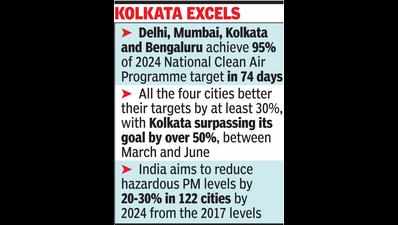- News
- City News
- nagpur News
- 95% of NCAP target achieved in 74 days
Trending
This story is from July 4, 2020
95% of NCAP target achieved in 74 days

Nagpur: In some good news for New Delhi, Mumbai, Kolkata and Bengaluru, the lockdown has resulted in these four cities achieving 95% of their 2024 National Clean Air Programme (NCAP) target in just 74 days.
This observation came to the fore in an analysis done by researchers from Respirer Living Sciences and Carbon Copy who analysed the average air quality during the four phases of the lockdown in the country as well as concentrations during the individual phases for PM2.5, PM10, nitrogen dioxide (NO2), carbon monoxide (CO), ozone (O3) and Benzene for the four cities.
The data was sourced from air quality monitors set-up by the state pollution control
Boards which is also being used by the NCAP. Released in January 2019 by the union environment ministry, the programme has categorized 102 cities as non attainment. Under NCAP, the government has set a target of reducing 30% air pollution by 2024, by keeping 2017 as a base year.
According to the experts, the lockdown gave them the opportunity to understand the background pollution levels across India. At a webinar recently hosted by Delhi-based communications initiative, Climate Trends, Dr Sagnik Dey from the Indian Institute of Technology, Delhi, explained that out of the eight primary polluting sources in India, four were completely closed during the lockdown period — construction and industrial activity, brick kilns and vehicles.
The tracker also analysed PM2.5 and PM10 levels in the four cities across 2017, 2018 and 2019 to demonstrate the effectiveness of NCAP in bringing down pollution, taking levels in 2017 as the base year. While Kolkata witnessed an approximate 24% improvement in PM levels in 2019 in comparison to 2018, Mumbai averaged (16%), Bengaluru (19.8%) and Delhi (6.4%) but the improvement fell short of the NCAP targets.
Experts feel that the drastic drop in pollution levels during the lockdown teaches lessons in India’s air pollution management which need to be incorporated in achieving the country’s clean air targets. Aarti Khosla, director at Climate Trends, said, “Bringing all economic activity to a halt brought about gains in air quality which have otherwise been envisaged as part of the next five years, to be achieved through NCAP. The drastic reduction in pollutants across cities strengthens the fundamental need for managing air quality as a regional issue, across the same air shed, such that gains of clearer skies can happen along with growth and economic activity. Lessons from the lockdown make it clear that city action plans need to be much more comprehensive in their strategy and approach to air pollution management.”
This observation came to the fore in an analysis done by researchers from Respirer Living Sciences and Carbon Copy who analysed the average air quality during the four phases of the lockdown in the country as well as concentrations during the individual phases for PM2.5, PM10, nitrogen dioxide (NO2), carbon monoxide (CO), ozone (O3) and Benzene for the four cities.
The data was sourced from air quality monitors set-up by the state pollution control
Boards which is also being used by the NCAP. Released in January 2019 by the union environment ministry, the programme has categorized 102 cities as non attainment. Under NCAP, the government has set a target of reducing 30% air pollution by 2024, by keeping 2017 as a base year.
Data from the four lockdown phases was compared with 2024 NCAP targets for each of the four cities along with the reduction already achieved during the four lockdown phases and individually in each phase. “The lockdown period helped us understand the effects from anthropogenic emissions to our environment. All four cities analysed managed to better their 2024 NCAP target by around 30%, with Kolkata bettering their target by over 50% during this lockdown. This period is a marker for policymakers on how they can achieve what has been planned for in the coming four years, in a relatively shorter period,” said Ronak Sutaria, CEO, Respirer Living Sciences.
According to the experts, the lockdown gave them the opportunity to understand the background pollution levels across India. At a webinar recently hosted by Delhi-based communications initiative, Climate Trends, Dr Sagnik Dey from the Indian Institute of Technology, Delhi, explained that out of the eight primary polluting sources in India, four were completely closed during the lockdown period — construction and industrial activity, brick kilns and vehicles.
The tracker also analysed PM2.5 and PM10 levels in the four cities across 2017, 2018 and 2019 to demonstrate the effectiveness of NCAP in bringing down pollution, taking levels in 2017 as the base year. While Kolkata witnessed an approximate 24% improvement in PM levels in 2019 in comparison to 2018, Mumbai averaged (16%), Bengaluru (19.8%) and Delhi (6.4%) but the improvement fell short of the NCAP targets.
Experts feel that the drastic drop in pollution levels during the lockdown teaches lessons in India’s air pollution management which need to be incorporated in achieving the country’s clean air targets. Aarti Khosla, director at Climate Trends, said, “Bringing all economic activity to a halt brought about gains in air quality which have otherwise been envisaged as part of the next five years, to be achieved through NCAP. The drastic reduction in pollutants across cities strengthens the fundamental need for managing air quality as a regional issue, across the same air shed, such that gains of clearer skies can happen along with growth and economic activity. Lessons from the lockdown make it clear that city action plans need to be much more comprehensive in their strategy and approach to air pollution management.”
End of Article
FOLLOW US ON SOCIAL MEDIA










